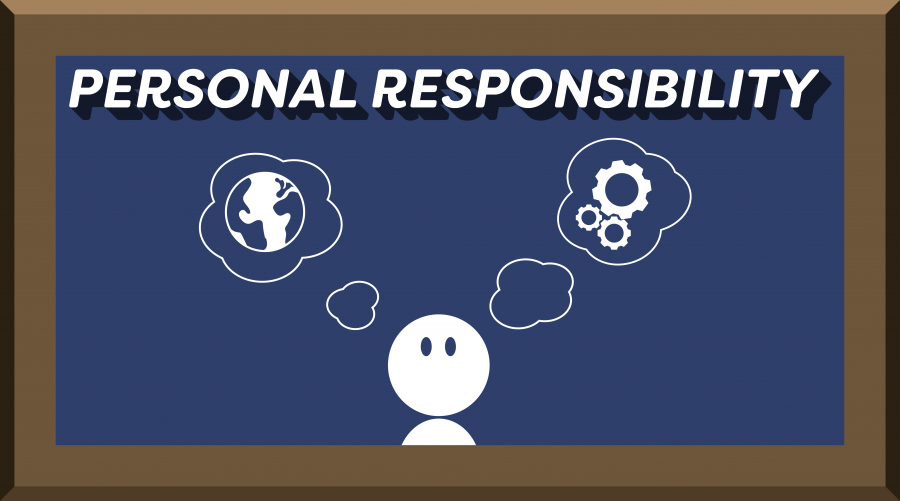Responsibility comes in all shapes, sizes but provides similarities (with video)
January 23, 2017
Introspection is hard. As teenagers, it is decidedly easier to ignore the flaws in ourselves and focus on others. However, there comes a point in our lives when we have to ask ourselves what falls under our umbrella of responsibility.
This is a difficult question to answer. As we grow up, those responsibilities change. And to some extent, it varies from person to person. However, there are some enduring truths about responsibility which cross cultural and historical lines.
In an age where we are all encouraged to define ourselves by the certain groups we fall under, when it comes to our skin color, sexual orientation or any other cultural marker, personal responsibility sounds like a foreign concept.
As we turn into adults, becoming responsible for ourselves and our actions without hiding in our respective groups is paramount to success. This means every decision we make is our own. This can have a flipside: every accomplishment is your own. Your success will be defined by you and you will receive the reward.
Too often we ignore our own responsibility in a situation and instead fall back on our social and cultural groups to ignore the consequences of our actions and validate our less-worthy version of ourselves.
This should be a pretty basic guideline. You are responsible for your actions. But, personal responsibility is something much deeper and beautiful than one would expect.
Russian historian Alexandr Solzhenitsyn said it best in his Harvard commencement address in 1978, “..the fulfillment of a permanent, earnest duty so that one’s life journey may become an experience of moral growth, so that one may leave life a better human being than one started it.”
Solzhenitsyn understood human beings are all going to die someday and so one’s purpose on Earth is something deeper than accumulating as much external wealth as possible or surface level responsibilities on this Earth.
Initially, having to own up to our mistakes, flaws and inadequacies is never a fun task. But this is such a reductionist way of thinking about progress. The journey to discovering the best version of ourselves is a perpetual one, and when done with the right frame of mind, can be a fulfilling task.
Our path to become better people will never end; this fact is something to be celebrated for this also means that there is no limit to the happiness one can discover in life as one becomes a better person.
Of course becoming a “better” person is subjective but we can all agree that there are some basic behaviors that yield fulfilling results.
Unfortunately, as we get older, those basic behaviors become juvenile and so the expectations of what we are responsible for changes. Our position in society will become much more significant.
In America, this means something quite unique. Amidst the hullabaloo of multiculturalism, it is important to remember that we are all American first. Not white, not black, but American.
As we grow up, fall in love, get married and have children, there is a certain responsibility each man and woman has to contributing to the culture that allowed them such freedoms. This culture is distinctly American and deeply influenced by Western culture.
We have our responsibility to our family and our friends: to treat them with love and respect. But on a broader standpoint, the values that lend themselves to this natural generosity and care for bettering ourselves and helping others is American.
Fortunately, the best way to preserve this culture is by living out our lives following basic rules of self-improvement, generosity and general enthusiasm for what life can bring – aside from wealth.
So, one’s individual responsibility is much more expansive than one might initially believe.
Ultimately, our individual responsibility will account for the other parts of our lives. If we want to be better people and by extension, happier people, treating others and living a moral life is a necessity.
If I fail to name any specific responsibilities it is because to be any more specific would leave me subject to endless hypothetical situations and counter-situations. But what I have written about will hopefully provide an outline of what being a responsible individual should look like in our society, in my young, humble opinion.










